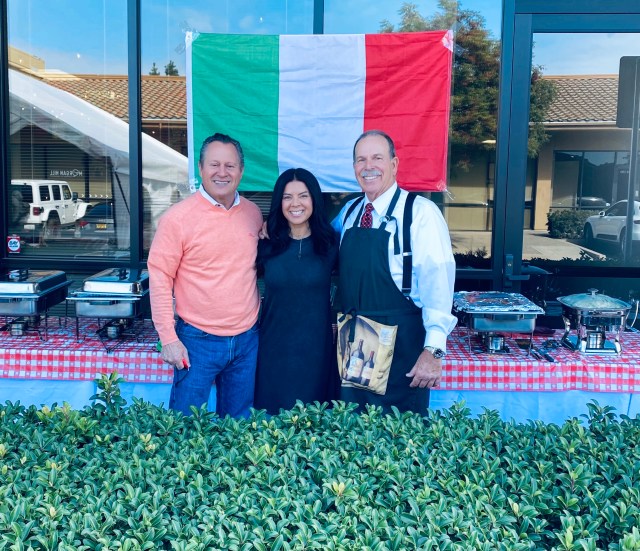By Gino Blefari
This week my travels found me at home, starting Monday with my typical WIG calls. On Tuesday, I began the morning with a Berkshire Hathaway Energy call then celebrated Italian Day … but more about that later. On Wednesday, I attended the Berkshire Hathaway Energy Sustainability Summit, which began with opening remarks from Greg Abel, Vice Chair of Non-Insurance Operations at Berkshire Hathaway Inc.; and Chair, Berkshire Hathaway Energy and Cathy Woollums, Senior Vice President, Chief Sustainability Officer for Berkshire Hathaway Energy. I also attended the Long & Foster shareholder meeting then traveled to Orange County. Today, I attended the Berkshire Hathaway Energy Executive Leadership Conference themed “Transforming Our Business” all morning then it was off to beautiful Laguna Beach for the Berkshire Hathaway HomeServices California Properties LUX event, where I introduced my good friend and great coach/speaker Tom Ferry and in the afternoon, participated in a photo op with California Properties luxury agents Cristal Clarke and Nigel Copley. Tomorrow, I’ll attend LUX in the morning then travel home.
I want to return to Italian Day, which I celebrated with Ben Bruno of Intero Real Estate Morgan Hill and the Intero Morgan Hill team. For a little history, Morgan Hill was the first office that opened at Intero Real Estate Services; it is an iconic location, one that truly reflects the uniquely collaborative, family-first culture that defines Intero to this day.
To celebrate Italian Day, we all safely came together, and it felt like a big family reunion. The warmth from every member of the team was palpable, and it reminded me of growing up in a welcoming Italian home.
This post is dedicated to that heritage, and the leadership lessons we can learn from the Italians.
A model of innovation. In a 2016 Harvard Business Review article, writer Eric Weiner said for inspiration to create the ideal model of innovation, we should look to the Italian Renaissance. “Those hoping to launch the world’s next great innovation hub [should examine an] older … remarkable genius cluster: Renaissance Florence,” he wrote. He recalls the story of the Medicis of Florence, who were “legendary talent spotters,” and used their immense wealth to sponsor talent and help it flourish. One day, Lorenzo Medici was walking through Florence and saw a 14-year-old boy sculpting a faun (a half-man, half-goat figure from Roman mythology). Lorenzo was blown away by the meticulous detail and the boy’s extraordinary ability to seemingly unleash this creature from within the stone. He invited the young boy to live with him and his children, where the artist could hone his craft. That boy’s name was Michelangelo. This model of innovation, wrote Weiner, is one we can learn from, because talent when spotted should always be fostered with proper mentorship and support. It’s how we can create the next generation of world-changing innovators.
Everything is marked by perpetual improvement. In 1503 Leonardi da Vinci had gained prominence for his work and could pick and choose what commissions he wanted to take on. He decided his next endeavor would be a portrait of a Florentine merchant’s wife, named Madam Lisa Giocondo. As he traveled from Milan to Rome to France, da Vinci carried the painting with him, constantly tweaking and improving it along the way. It was found in his studio when he died and today, the Mona Lisa is considered one of the most valuable paintings in the world. Can you believe da Vinci thought there was room to improve it?
The recipe for leadership is always changing. If you’ve ever had home-cooked Italian spaghetti and meatballs or cheesy chicken parmesan, you know there’s probably no recipe book that contains the exact culinary creation. Italian cooks craft dishes from the heart and soul, adding a pinch of this, a sprinkle of that and ultimately, the outcome is delicious. They practice their art, they change their recipe over time, and they understand that success in cooking (like success in leadership) is not a strict recipe to follow but a lifelong pursuit. Some Italian chefs spend years perfecting the most seemingly simple recipes and may never admit that they’re “just right.”
So, what’s the message? Italian heritage is based on family and fun. It’s what we felt with Ben Bruno, Manager Steve Barsanti and his team at Intero Morgan Hill and it’s the culture we should seek to build in our offices, among our teams and even inside our homes to better connect with family and friends … the Italian way!


Respond to Thoughts on Leadership: Leadership Lessons from the Italians